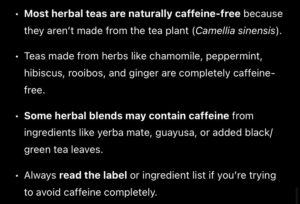Does Herbal Tea Have Caffeine? A Complete Guide
Many people are looking for more relaxing, caffeine-free options to start or end their day in a world full with coffee shops and energy beverages. Among the most well-liked options? tea made with herbs. Does herbal tea include caffeine, though? In a nutshell, caffeine is absent from the majority of herbal teas. The answer is somewhat nuanced, though, as is the case with most things in the wellness realm.
This guide will explain everything for you, whether you’re attempting to reduce your caffeine intake, searching for a drink to have before bed, or just wondering what’s in your cup.
What Exactly Is Herbal Tea?
Herbal tea isn’t actually tea, at least not in the conventional sense, even if it is referred to as such. The leaves of the Camellia sinensis plant are used to make all true teas, including black, green, white, oolong, and Pu-erh. Caffeine levels in these teas vary naturally. The leaves, flowers, seeds, roots, bark, or fruits of plants other than Camellia sinensis are used to make herbal teas. Consider ginger, rooibos, hibiscus, peppermint, and chamomile. Tisanes are another name for these herbal mixtures. The majority of herbal teas are inherently caffeine-free as they are not manufactured from the tea plant.
Why Go Caffeine-Free?

There are plenty of reasons people choose to avoid or reduce caffeine:
• Better sleep: Caffeine can interfere with sleep patterns, especially if consumed in the afternoon or evening.
• Reduced anxiety: Caffeine is a stimulant, which can increase anxiety or jitteriness in sensitive individuals.
• Heart health: Some people with heart conditions or high blood pressure may be advised to limit caffeine.
• Pregnancy and breastfeeding: Many doctors recommend cutting back on caffeine during pregnancy.
For all these reasons and more, herbal teas are a gentle, comforting choice.
Herbal Teas That Are 100% Caffeine-Free
)
Here are some of the most popular naturally caffeine-free herbal teas:
1. Chamomile Tea
Chamomile is a popular tea for bedtime because of its well-known relaxing properties. It is also free of caffeine and frequently used to ease stress and improve digestion.
2. Peppermint Tea
Peppermint tea is calming and refreshing, and it helps with sinuses and digestion. It is suitable for any time of day and has no caffeine.
3. Hibiscus Tea
Hibiscus tea, which is acidic and bright red, has been associated with advantages for blood pressure and is high in antioxidants. It is often consumed cold and has no caffeine by nature.
4. Rooibos Tea
Rooibos (pronounced roy-boss) comes from South Africa and has a sweet, nutty flavor. It’s caffeine-free and loaded with antioxidants.
5. Lemon Balm Tea
This herb from the mint family is great for calming the nerves and promoting sleep. And yes, no caffeine here.
6. Ginger Tea
Ginger tea is a warming, spicy option that’s great for digestion and nausea. It’s caffeine-free and often used for its anti-inflammatory properties.
Hidden Sources of Caffeine in Herbal Blends

Not all herbal teas contain caffeine, although the majority do. Caffeinated tea leaves or naturally caffeine-containing substances may be present in some “herbal” tea mixes. Here are some things to watch out for:
1. Yerba Mate
The leaves of the Ilex paraguariensis plant are used to make yerba mate, which is frequently added to “herbal” energy teas. Yes, it has caffeine, sometimes much more than coffee!
2. Guayusa
Another plant from the holly family, guayusa contains natural caffeine and is often used in energy teas.
3. Green or Black Tea Blends
Some “herbal” teas may be blends that contain black or green tea for extra taste or health benefits. Read the label at all times.
4. Cacao (or Cocoa Husk) Tea
This chocolatey tea is made from the shell of cacao beans. While the caffeine content is much lower than coffee or regular tea, it does contain a small amount.
How to Tell If an Herbal Tea Has Caffeine
Examine the label:
Look at the ingredients if the caffeine content isn’t stated. Caffeine is probably present if you see “green tea,” “black tea,” “yerba mate,” or “guayusa.”
Look for certifications:
Some brands label their teas as “100% caffeine-free” or “naturally caffeine-free,” which is a good sign.
Check the color and aroma:
While this isn’t a foolproof method, darker brews with a strong, earthy aroma are more likely to contain some kind of tea leaf or energizing herb.
Can You Drink Herbal Tea Before Bed?
Of course. Actually, a lot of herbal teas are made to be consumed at night. Popular options for encouraging rest and relaxation include teas made from chamomile, lavender, lemon balm, and valerian root.
A cup of herbal tea is among the greatest choices available if you’re sensitive to caffeine or simply want to unwind at the end of the day. Just check the label to be sure it is actually caffeine-free.
Final Thoughts: Does Herbal Tea Have Caffeine?
To sum it all up

Have a Favorite Herbal Tea?
Let us know your go-to herbal tea in the comments below!
